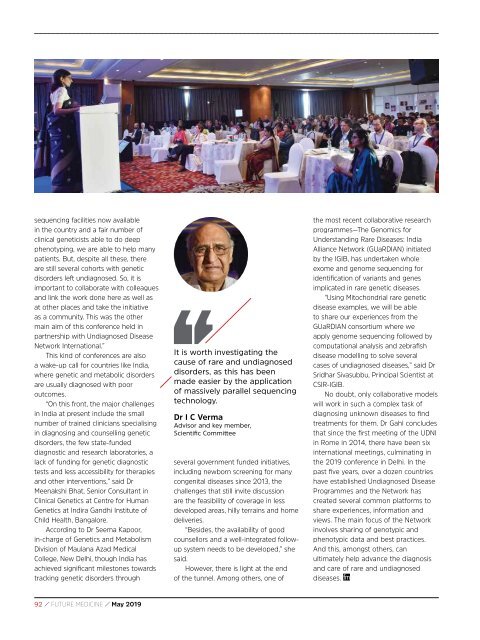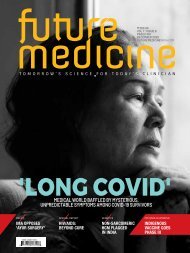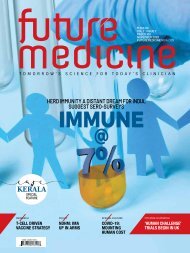may edition file
Create successful ePaper yourself
Turn your PDF publications into a flip-book with our unique Google optimized e-Paper software.
sequencing facilities now available<br />
in the country and a fair number of<br />
clinical geneticists able to do deep<br />
phenotyping, we are able to help many<br />
patients. But, despite all these, there<br />
are still several cohorts with genetic<br />
disorders left undiagnosed. So, it is<br />
important to collaborate with colleagues<br />
and link the work done here as well as<br />
at other places and take the initiative<br />
as a community. This was the other<br />
main aim of this conference held in<br />
partnership with Undiagnosed Disease<br />
Network International.”<br />
This kind of conferences are also<br />
a wake-up call for countries like India,<br />
where genetic and metabolic disorders<br />
are usually diagnosed with poor<br />
outcomes.<br />
“On this front, the major challenges<br />
in India at present include the small<br />
number of trained clinicians specialising<br />
in diagnosing and counselling genetic<br />
disorders, the few state-funded<br />
diagnostic and research laboratories, a<br />
lack of funding for genetic diagnostic<br />
tests and less accessibility for therapies<br />
and other interventions,” said Dr<br />
Meenakshi Bhat, Senior Consultant in<br />
Clinical Genetics at Centre for Human<br />
Genetics at Indira Gandhi Institute of<br />
Child Health, Bangalore.<br />
According to Dr Seema Kapoor,<br />
in-charge of Genetics and Metabolism<br />
Division of Maulana Azad Medical<br />
College, New Delhi, though India has<br />
achieved significant milestones towards<br />
tracking genetic disorders through<br />
It is worth investigating the<br />
cause of rare and undiagnosed<br />
disorders, as this has been<br />
made easier by the application<br />
of massively parallel sequencing<br />
technology.<br />
Dr I C Verma<br />
Advisor and key member,<br />
Scientific Committee<br />
several government funded initiatives,<br />
including newborn screening for many<br />
congenital diseases since 2013, the<br />
challenges that still invite discussion<br />
are the feasibility of coverage in less<br />
developed areas, hilly terrains and home<br />
deliveries.<br />
“Besides, the availability of good<br />
counsellors and a well-integrated followup<br />
system needs to be developed,” she<br />
said.<br />
However, there is light at the end<br />
of the tunnel. Among others, one of<br />
the most recent collaborative research<br />
programmes—The Genomics for<br />
Understanding Rare Diseases: India<br />
Alliance Network (GUaRDIAN) initiated<br />
by the IGIB, has undertaken whole<br />
exome and genome sequencing for<br />
identification of variants and genes<br />
implicated in rare genetic diseases.<br />
“Using Mitochondrial rare genetic<br />
disease examples, we will be able<br />
to share our experiences from the<br />
GUaRDIAN consortium where we<br />
apply genome sequencing followed by<br />
computational analysis and zebrafish<br />
disease modelling to solve several<br />
cases of undiagnosed diseases,” said Dr<br />
Sridhar Sivasubbu, Principal Scientist at<br />
CSIR-IGIB.<br />
No doubt, only collaborative models<br />
will work in such a complex task of<br />
diagnosing unknown diseases to find<br />
treatments for them. Dr Gahl concludes<br />
that since the first meeting of the UDNI<br />
in Rome in 2014, there have been six<br />
international meetings, culminating in<br />
the 2019 conference in Delhi. In the<br />
past five years, over a dozen countries<br />
have established Undiagnosed Disease<br />
Programmes and the Network has<br />
created several common platforms to<br />
share experiences, information and<br />
views. The main focus of the Network<br />
involves sharing of genotypic and<br />
phenotypic data and best practices.<br />
And this, amongst others, can<br />
ultimately help advance the diagnosis<br />
and care of rare and undiagnosed<br />
diseases.<br />
92 / FUTURE MEDICINE / May 2019


















